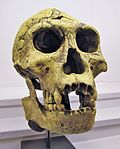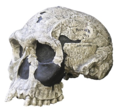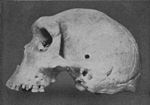Homo ergaster is an extinct species or subspecies of archaic humans who lived in Africa in the Early Pleistocene. Whether H. ergaster constitutes a species...
72 KB (9,279 words) - 01:50, 9 November 2024
ago and spread throughout Africa (debatably as another species called Homo ergaster) and Eurasia in several migrations. The species was adaptive and successful...
94 KB (8,007 words) - 05:28, 29 December 2024
Dmanisi hominins (redirect from Homo ergaster georgicus)
between the skulls. Their initial description classified them as Homo (erectus?) ergaster (an otherwise African taxon), or potentially an early offshoot...
72 KB (8,517 words) - 01:14, 3 November 2024
members. However, unlike what is presumed for H. ergaster and later Homo, short-statured early Homo are generally considered to have been incapable of...
52 KB (6,319 words) - 04:00, 25 November 2024
Human taxonomy (redirect from Homo sapiens sapiens)
palaeojavanicus, Homo erectus soloensis, Homo erectus tautavelensis, Homo erectus georgicus. The distinction from descendant species such as Homo ergaster, Homo floresiensis...
35 KB (5,163 words) - 16:27, 16 December 2024
remains represent a different Homo species, which coexisted with H. habilis and H. ergaster/H. erectus. Coexisting Homo species conflicted with the predominant...
32 KB (3,908 words) - 16:05, 17 December 2024
sufficiently different from the other locally recognised Homo species (H. habilis and H. ergaster/H. erectus) to represent a new species. The classification...
14 KB (1,582 words) - 08:32, 2 November 2024
Homo luzonensis, also known as Callao Man and locally called "Ubag" after a mythical caveman, is an extinct, possibly pygmy, species of archaic human from...
15 KB (1,683 words) - 19:37, 26 December 2024
Human (redirect from HomoSapiens)
species are Homo habilis and Homo rudolfensis which evolved by 2.3 million years ago. H. erectus (the African variant is sometimes called H. ergaster) evolved...
264 KB (25,381 words) - 07:12, 19 December 2024
Human evolution (redirect from Evolution of Homo sapiens)
separate species, H. ergaster, or as H. erectus ergaster, a subspecies of H. erectus. Many paleoanthropologists now use the term Homo ergaster for the non-Asian...
264 KB (26,344 words) - 18:01, 2 January 2025
contemporaneous Tighennif remains from Algeria (usually classified as Homo ergaster [=? Homo erectus], originally "Atlantanthropus mauritanicus") represent the...
67 KB (8,526 words) - 18:22, 20 December 2024
ago. Continuing the pattern of hominid dental morphological evolution, ergaster had a less prognathic face, smaller dental arcade. The mandibular symphysis...
19 KB (2,015 words) - 06:44, 31 October 2024
Homo naledi is an extinct species of archaic human discovered in 2013 in the Rising Star Cave system, Gauteng province, South Africa (See Cradle of Humankind)...
56 KB (6,277 words) - 19:53, 31 December 2024
Neanderthal (redirect from Homo sapiens neanderthalensis)
claimed by some that this feature would be normal for all Homo, even tropically-adapted Homo ergaster or erectus, with the condition of a narrower thorax in...
335 KB (36,348 words) - 01:36, 23 December 2024
Early modern human (redirect from Anatomically modern Homo sapiens)
anatomically modern human (AMH), are terms used to distinguish Homo sapiens (sometimes Homo sapiens sapiens) that are anatomically consistent with the range...
115 KB (12,594 words) - 04:35, 2 January 2025
to have descended from African H. erectus — sometimes classified as Homo ergaster — during the first early expansions of hominins out of Africa beginning...
66 KB (8,069 words) - 18:50, 2 January 2025
Homo floresiensis ( /flɔːrˈɛziːˌɛn.sɪs/), also known as "Flores Man" or "Hobbit" (after the fictional species), is an extinct species of small archaic...
73 KB (7,573 words) - 19:17, 19 December 2024
Australopithecus sediba (redirect from Homo sediba)
Early Pleistocene, and coexisted with Paranthropus robustus and Homo ergaster / Homo erectus. Malapa Cave may have been a natural death trap, the base...
53 KB (6,695 words) - 04:06, 2 November 2024
candidates Homo ergaster (or "African H. erectus") Homo naledi Eurasian H. erectus candidates: Homo antecessor Homo heidelbergensis Homo floresiensis Homo rhodesiensis...
133 KB (15,522 words) - 21:47, 19 December 2024
heidelbergensis. It has features that represent a transition between Homo ergaster/erectus and Homo sapiens. Ndutu cranium, "the hominid from Lake Ndutu" in northern...
27 KB (3,024 words) - 23:32, 4 September 2024
Paleolithic (section Homo erectus)
Terra Amata. Fire was used by the Lower Paleolithic hominins Homo erectus and Homo ergaster as early as 300,000 to 1.5 million years ago and possibly even...
107 KB (11,394 words) - 02:05, 19 December 2024
Australopithecus africanus (redirect from Homo Transvaalensis)
Humankind Homo ergaster – Extinct species or subspecies of archaic human Homo rudolfensis – Extinct hominin from the Early Pleistocene of East Africa Homo habilis –...
54 KB (6,880 words) - 06:48, 7 November 2024
Denisovan (redirect from Homo Denisovan)
million years ago. Denisovans may represent a new species of Homo or an archaic subspecies of Homo sapiens (modern humans), but there are too few fossils to...
73 KB (7,480 words) - 03:39, 13 December 2024
paniscus Homo habilis Homo rudolfensis Homo ergaster Homo erectus Homo antecessor Homo heidelbergensis Homo naledi Homo neanderthalensis Homo denisova Homo sapiens...
24 KB (2,425 words) - 09:39, 19 December 2024
Homo longi is an extinct species of archaic human identified from a nearly complete skull, nicknamed 'Dragon Man', from Harbin on the Northeast China Plain...
18 KB (2,056 words) - 20:19, 6 December 2024
Timeline of human evolution (section Homo)
the major events in the evolutionary lineage of the modern human species, Homo sapiens, throughout the history of life, beginning some 4 billion years ago...
88 KB (3,574 words) - 10:30, 19 November 2024
Origin of language (section Early Homo)
archaic Homo, beginning with Homo ergaster and reaching the highest sophistication in the Middle Pleistocene with Homo heidelbergensis and Homo neanderthalensis...
172 KB (21,215 words) - 03:47, 31 December 2024
ago, Homo spread throughout East Africa and to Southern Africa (Homo ergaster), but not yet to West Africa. Around 1.8 million years ago, Homo erectus...
112 KB (11,997 words) - 05:09, 9 December 2024
Australopithecine (section Relation to Homo)
extinct, close relatives of modern humans and, together with the extant genus Homo, comprise the human clade. Members of the human clade, i.e. the Hominini...
17 KB (1,550 words) - 12:26, 2 December 2024
European early modern humans (EEMH) were the first early modern humans (Homo sapiens) to settle in Europe, migrating from western Asia, continuously occupying...
154 KB (19,176 words) - 16:36, 29 December 2024



























